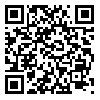BibTeX | RIS | EndNote | Medlars | ProCite | Reference Manager | RefWorks
Send citation to:
URL: http://jcp.khu.ac.ir/article-1-3925-en.html
The present study aimed to investigate the mediating role of cognitive self-efficacy in the relationship between early maladaptive schemas and psychological vitality in individuals with generalized anxiety disorder. The statistical population consisted of all clinical medical students at Golestan University in 2024, from which a sample of 120 students was selected through non-random convenience sampling. The research instruments included the Young Schema Questionnaire – Short Form (1998), the Cognitive Self-Efficacy Scale by Sherer et al. (1982), and the Psychological Vitality Scale developed by Kahn and Crawford (2003). Data were analyzed using structural equation modeling (SEM). The results indicated that early maladaptive schemas had a significant negative relationship with psychological vitality, and this relationship was mediated by reduced cognitive self-efficacy. In other words, early maladaptive schemas lead to decreased psychological vitality in individuals with generalized anxiety disorder by weakening cognitive self-efficacy. These findings highlight the importance of addressing early maladaptive schemas and enhancing cognitive self-efficacy as therapeutic strategies to improve psychological vitality and overall mental well-being in individuals suffering from anxiety. Accordingly, it is recommended that psychological interventions simultaneously target schema modification and self-efficacy enhancement.
Received: 2024/10/12 | Accepted: 2024/12/21 | Published: 2024/12/21
| Rights and permissions | |
 |
This work is licensed under a Creative Commons Attribution-NonCommercial 4.0 International License. |






